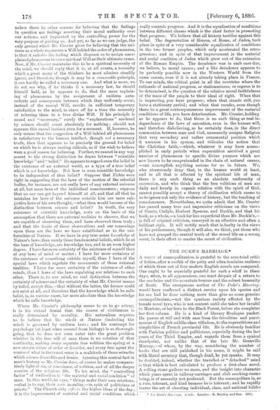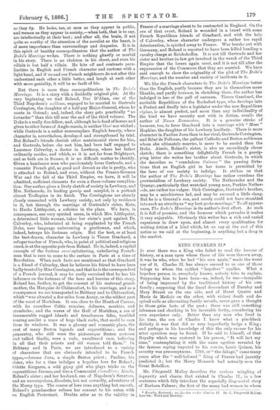THE DUKE'S MARRIAGE.*
A WHIFF of cosmopolitanism is grateful to the sore-tried critic of fiction, after a surfeit of the petty and ultra-feminine realisms of which three out of four modern English novels are composed. One ought to be especially grateful for such a whiff in these days, when, to all appearances, one must despair of a return to the sea-brine and the mountain breezes and the robust humanity of Scott. The anonymous author of The Duke's Marriage would have conferred a distinct service upon his species and his sex had he done nothing more than give us some genuine cosmopolitanism,—not • the spurious variety affected by the female novel tyro, who is not content until she takes her invalid to Mentone, or her hero to the Black Forest, before she completes her first volume. He is a kind of literary Boulogne packet. He passes at will and with ease from the frivolities and parsi- monies of English middle-class villadom, to the superstitions and simplicities of French provincial life. He is obviously familiar with Parisian politics and politicians, especially during the last years of the Third Empire, and regards them from a cynical. standpoint, not unlike that of the late Mr. Grenville Murray,—of whom, by the way, considering the number of books that are still published in his name, it might be said with literal accuracy that though dead, he yet speaks, It may be doubted, indeed, whether the travelled or "detached" mind is that which is best calculated to produce a first-class novel. A rolling stone gathers no moss, and the insight into character which years spent in railway-carriages and club smoking-rooms bring, is of necessity not profound. But the cosmopolitan is, as a rule, tolerant, and kind because he is tolerant; and he rapidly learns the art of shooting individual, class, and national foibles • The Duke's Marr;aye. 3 vols. London : R. Bentley nod Bon. 1886.
as they fly. He looks, too, at men as they appear in public, and women as they appear in society,—when both, that is to say, are intellectually at their best ; and after all, the brain, if not quite so worthy of the attention of the novelist as the heart, is of more importance than surroundings and draperies. It is in this spirit of healthy cosmopolitanism that the author of The Duke's Marriage writes. There is nothing ghastly or morbid in his story. There is no skeleton in his closet, and even his villain is but half a villain. He hits off and contrasts pecu- liarities in English and French character and customs with a light hand, and if we and our French neighbours do not after this understand each other a little better, and laugh at each other with more geniality, it will be no fault of his.
But there is more than cosmopolitanism in The Duke's Marriage. It is a story with a decidedly original plot. At the very beginning we find Roland, Due D'Alma, one of the Third Napoleon's noblesse, engaged to be married to Gertrude Corrington, the daughter of a half-pay Major-General, whom he meets in Ostend ; and, indeed, the story gets practically "no forrarder" than this till near the end of the third volume. The Duke is a really fine fellow, and, although he is fond of horses and given to other forms of Anglo-mania, is neither blast.; nor wicked ; while Gertrude is a rather commonplace English beauty, whose character is, nevertheless, developed and strengthened by trial. But Roland's friends cherish other matrimonial views for him, and Gertrude, before she met him, had been half engaged to Laurence Calverley, a doctor in Lewbury, where her father ordinarily resides, and which, as it is not far from Brightport, and as both are in Sussex, it is no difficult matter to identify. Given a handsome man who passionately loves Gertrude, and a romantic French girl, as good and devout as she is pretty, who is attached to Roland, and even, without the Franco-German War and the fall of the Third Empire, we have, it will be admitted, sufficient elements for even a three-volume complica- tion. Our author gives a lively sketch of society in Lewbury, and Mrs. Nethersole, its leading gossip and marplot, is a portrait almost Trollopian in its finish. The Corringtons are already closely connected with Lewbury society, not only by residence in it, but through the marriage of Gertrude's sister, Kate, to Hacks Littlepoint, a solicitor in the place. We have, in consequence, one very spirited scene, in which Mrs. Littlepoint, a determined little woman, takes her sister's part against Dr. Calverley, who, infuriated at being supplanted by the French Duke, uses language unbecoming a gentleman, and which, indeed, betrays his footman origin. But the best, or at least the best-drawn, character in Lewbury is Timon Grachard, a refugee teacher of French, who, in point of political and religious 'creed, is at the opposite pole from Roland. He is, indeed, a capital example of the furious saer6sspluttering, unbelieving French- man that is sure to come to the surface in Paris at a time of Revolution. When such facts are mentioned as that Grachard is a friend of Calverley, that he believes his friend to have been badly treated by Miss Corrington, and that he is the correspondent of a French journal, it may be easily surmised that he has his influence on the fortunes of the hero and heroine of this story. Roland has, further, to get the consent of his maternal grand- mother, the Marquise de Chilteaufort, to his marriage, and as a consequence we are transported to Brittany and to Chfiteaufort, which "was situated a few miles from Auray, on the wildest part of the coast of Morbihan. It was, close to the Heath of Carnac, with its countless Celtic remains, dolmens, menhirs, and cromlechs ; and the waves of the Gulf of Morbihan, a sea of innumerable ragged islands and treacherous tides, tumbled roaring amidst a mass of huge black rocks, that could be seen from its windows. It was a gloomy and, romantic place, the seat of many Breton legends and superstitions ; and the peasantry, who still wore the picturesque Breton costume and talked Gaelic, were a rude, uncultured race, believing in all that their priests and old women told them." In Brittany and in Paris, we are introduced to a variety of characters that are obviously intended to be French types,—Jerome Java, a simple Breton priest ; Pauline, his sister, who for a time indulges a hopeless love for Roland ; {Mate Kergaree, a wild gipsy girl who plays tricks on the superstitious Jerome, and dies a Communist rivandii2re ; Aimee, Roland's sister ; and her husband, one of Napoleon's Senators, and an unscrupulous, dissolute, but not cowardly, adventurer of -the Morny type. The course of love runs anything but smooth. Roland's grandmother refuses her consent to his union with an English Protestant. Doubts arise as to the validity in
France of a marriage about to be contracted in England. On the eve of that event, Roland is wounded in a brawl with some French Republican friends of Grachard, and with the help of Calverley, whose character undergoes a rather too rapid deterioration, is spirited away to France. War breaks out with Germany, and Roland is reported to have been killed heading a cavalry charge at Reichshoffen. It is not till Gertrude and her sister and brother-in-law get involved in the wreck of the Third Empire that the lovers again meet, and it is not till after the suppression of the Commune that they are married. We have said enough to show the originality of the plot of The Duke's Marriage, and the number and variety of incidents in it.
We like the French characters in The Duke's Marriage better than the English, partly because they are in themselves more likeable, and partly because, in sketching them, the author has indulged in less of the gall of sarcasm. Timon Grachard, the excitable Republican of the Rochefort type, who develops into a Prefect and finally into a legislator under the new Republican regime, is almost perfect, and more than any individuality of the kind we have recently met with in fiction, recalls the author of Numa Boumeslan. It is a genuine stroke of humour, too, to force Grachard into a marriage with " &fees " Hopkins, the daughter of his Lewbury landlady. There is more character in Pauline Java than in her rival, Gertrude Corrington, and Rene de Polhuan, the gallant Catholic and Breton nobleman whom she ultimately marries, is more to be envied than the Duke. Aimee, Roland's sister, is also an exceedingly clever sketch ; there is something delightfully French in a gossip- ping letter she writes her brother about Gertrude, in which she describes as "scandalous liaisons " the passing flirta- tions that an English girl in her teens is permitted by the laws of our society to indulge, it strikes us that the author of The Duke's Marriage has rather overdone the provincialism of Lewbury society. The Nethersoles and the Quangs, particularly that wretched young man, Purkiss Nether- sole, are rather too vulgar. Dick Corrington, Gertrude's brother, may be a mischievous lad, and may be excused a little slang. But he is a General's son, and surely could not have stumbled into such an atrocity as "my best go-to-meetings." To all appear- ance, The Duke's Maniac° is its author's first effort. As such it is full of promise, and the humour which pervades it makes it very enjoyable. Obviously this writer has a rich and varied experience to draw upon, and almost every qualification for writing fiction of a kind which, let us say at the end of this notice as we said at the beginning, is anything but a drug in the market.















































 Previous page
Previous page